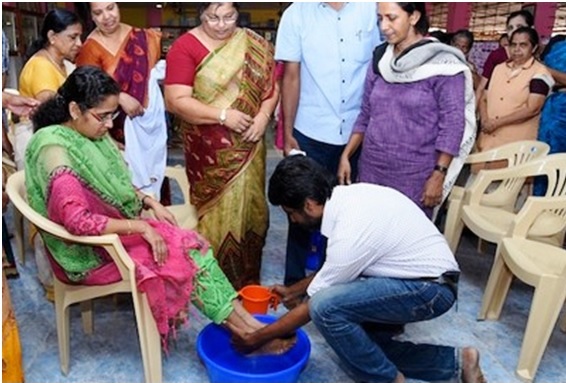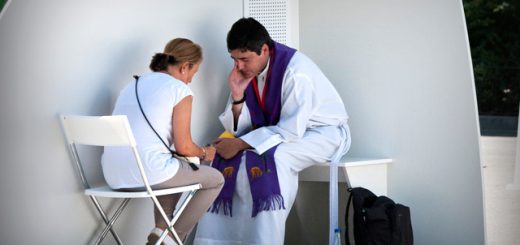Where is gender equality Syromalabarians? Why stick to Patriarchy, Insult to Pope’s example?

Cover Image: A husband washes his wife's feet as part of a special ritual organised by the Kerala State unit of the Indian Christian Women's Movement (ICWM) on March 28, one day, before Maundy Thursday. The ICWM works to promote the equality of both genders and all castes, among other agendas. (Photo provided)
dr james kottoor
 This article is to be read as a continuation of the one “Dalits or Hari-Jan” on wiping out Casteism and racism from Church and Society. Basically the whole question is to wipe out all human inequalities to resurrect Jesus-vision of Brotherhood and Sisterhood promoted also by Narayana Guru and Swami Vivekanda.
This article is to be read as a continuation of the one “Dalits or Hari-Jan” on wiping out Casteism and racism from Church and Society. Basically the whole question is to wipe out all human inequalities to resurrect Jesus-vision of Brotherhood and Sisterhood promoted also by Narayana Guru and Swami Vivekanda.
Divided and fighting churches in their thousands (Is Christ divided?) on Rite, Rituals, beliefs, man-made precepts and social practices is the scandal of the century among Catholics. It reached its ridiculous height of absurdity in the monstrosity called the “Pure-blood Kananaya Kottayam Diocese” in spite of ecclesiastical and secular court strictures and judgments against it.
Confronted with all these and other scandalous divisive happening someone has said: “The Syromalabar and Kanaya churches are going, going and going to be ZERO soon!” That alone will put an end to all “Better than thou” or “holier than thou” inequalities highlighted by Jesus in the parable of Pharisee and publican praying in the temple.
Gender Inequality
The latest is denial of gender equality which is a threat to a “reluctant, celibate Syromalabar Hierarchy” forgetting, they too are products of the wombs of their mothers. Do they look upon their mothers and sisters as tempting Eves? In this context think also of the absurdity or stupidity of denying priesthood to women, forgetting it was a lady (Mary) who brought forth Jesus in real flesh and blood, which none of the male celibate priestly class can do, except through some man-made mysterious and therefore incomprehensible and disputed sacrament called ‘priesthood’, which is created by the church-institution to enforce male domination.
Just make a simple comparison. Don’t even our Hindu Pujaris infuse divinity into a dead stone through their “Mantras”, equally mysterious like the words of consecration and put it up for worship as ‘Shiva-linga’ or Kali? What is the difference between the two, for thinking sections of worshipers? So if there is to be a sacramental priesthood – all sacraments are man-made, say learned theologians – to bring forth Jesus on the altar, who is better qualified: a woman or man?
To put it bluntly and brutally, bordering on scandal, a crazy wit blurted out: “Gender inequality in the Catholic church would be butchered and buried for good only when we will have ‘Pregnant Pope!’ How will you blunt the piercing edge of this argument? I don’t know, I confess, in spite of universal agreement that pregnancy is sacred for any married lady, as the ‘immaculate conception’ was for Mary. Is a Pope greater than Mary?
So cheers to Kerala’s Indian Christian Women's Movement (ICWM) which organized foot-washing rituals on March 28. The central message of Jesus was his deeds and words:
1. Deeds: His self-emptying, his being born in a cattleshed and his foot-washing at the last supper;
2. Words: “Do to one another, what I have done to you.” Are these not the two things his true followers have to copy in their daily lives? If we call ourselves the CATTLE CLASS, it is a loud proclamation of our effort to be like Jesus or lesser mortals like Ambedkar or Vivekananda.
125 years ago, Swami Vivekananda called Kerala a “Lunatic Asylum of caste and class distinctions, By refusing to wash women’s feet are they not proclaiming they have not grown one bit ever since? By refusing to heed the words and deeds of Jesus, or even of Pope Francis on foot-washing, are they not throwing the “Baby” (Jesus and his identification with the lowliest) with the bath water?
That adds luster to the bold foot-washing example of ICWM following Pope’s lead.The Kerala laity has spoken loud and clear. “Voice of people, voice of God!” But how can the Syro Hierachy benefit as long as they don’t have eyes to see, ears to hear, mouths to speak and courage to move their hands and feet and consider themselves to be ‘Sui Juris’ (law unto themselves) even above the Pope?
So are we wrong, when we are forced to infer that Syro-hierarchy’s leech-like sticking to patriarchy and male domination, is an insult to Pope’s own admonition by example? We can only comfort ourselves saying: ‘Do your bit, God will do the rest, nothing is impossible with Him!’ We still wish them well, even if they want to go to a Hell they believe in, we don’t!
Please read below an eye opening report in UCANIndia
on Kerala Laity’s reaction in protest to Hierarchical refusal
Socal significance of Christian
foot-washing ritual in India
Posted on April 10, 2018, in UCANIndia
By Kochurani Abraham, Kerala

Backlash against move by Indian Christian Women's Movement to include women in patriarchal ritual runs counter to Gospel.
Kerala: Amid fears of possible adverse consequences, the Kerala state unit of the Indian Christian Women's Movement (ICWM) organized foot-washing rituals on March 28, the day before Maundy Thursday. The idea was to promote the equality of both genders and all castes.
Part of this year's plan was to have the husbands and wives wash each other's feet amid a persistent refusal of the Eastern-Rite Catholic Churches, the dominant Christian communities in this southern state, to include women in the popular foot-washing ritual.
For some who opposed the ICWM's move, the women who organized the ceremony were considered "rebels," a group merely "looking for some cheap popularity through media coverage."
In their opinion, these "gimmicks" will have no impact on the traditions of their church or on society.The question then is this: Why did these women risk their reputations and take a subversive step in celebrating this ritual during this year's Passion Week, or Holy Week, which ran from March 25-31.
Perhaps a glimpse into the history of this ritualistic tradition in the Catholic Church will clarify the reasons behind their move. In the Catholic tradition, foot-washing is a ritual conducted on Maundy Thursday, one that commemorates the Biblical narrative of Jesus washing the feet of his disciples before the Last Supper.
In 2013, Pope Francis gave a new meaning to this ritual when he washed the feet of many "broken ones" on the margins of society. That included women and people of other faiths.
In 2016, a Vatican directive opened up the possibility of having a representative group of people whose feet could be washed for the ritual. "Such small groups can be made up of men and women, and it is appropriate that they consist of people young and old, healthy and sick, clerics, consecrated men and women and laity," the directive said.
Kerala's largest Syro-Malabar Church, which accounts for four million Catholics among the state's six million Christians, is yet to adhere to the directive. This is based on the contention that the Eastern liturgical tradition allows only men to be part of this ritual. They also argue the Vatican directive is meant for the Latin rite Church, and not the Eastern-Rite churches.
During Holy Week last year, some members of the ICWM, an autonomous group of Christian women, celebrated the foot-washing ritual at a center for battered women and children in Kottayam, a central Kerala town.
What moved the ICWM to initiate this celebration was the conviction that the liberating significance of this powerful Gospel narrative needs to go beyond the politics of the churches and become a catalyst that can have a transformative impact on society.
Drawing energy from this powerful experience, which holds the potential to unify people stuck under oppressive hierarchies, the scope of the ritual was widened this year.
It was conducted at various venues in Kerala, and different dimensions of social discrimination in the Indian context were addressed.
Hence it was decided to hold the ritual in three major towns that have a considerable Christian presence — Ernakulam, Kottayam and Thiruvalla.The event planned at Ernakulam was ultimately aborted as the authorities of a Christian center where the program was to be conducted backed out presumably fearing adverse repercussions from the church hierarchy.
In Thiruvalla, the event was held at a center for destitute and sickly women run by a secular charitable trust.The sight of senior officials of the trust, all retired male college professors, washing the feet of these women was indeed a persuasive sign of self-emptying, healing and solidarity
In Kottayam, the primary focus was on washing the feet of the residents at a centre for homeless and people with disabilities run by the Navjeevan (New Life) Trust.Founded by P. U. Thomas, the trust feeds some 5,000 poor people daily in the city and offers shelter, care and love to hundreds more.
The ICWM chose Navjeevan to conduct the ritual as the life of its founder Thomas Chettan has become symbolic of what "washing the feet" signifies in today's world. Several couples were also invited to wash each other's feet. But many excused themselves for a variety of reasons. Some openly acknowledged their fear of being ridiculed by friends if they were to wash their wives' feet in public.
Only two couples finally went for the program. The gesture of seeing husbands wash their wives' feet posed a radical challenge to the prevailing social system based on gender hierarchy.That hierarchy defines marriage as a life-long commitment of servitude for a great majority of women.
Indian society continues to be deeply marked by a male-dominated hierarchical attitude where differences of class, caste and gender become the locus of violent and discriminating interventions in all its tyrannical intersections.
Exactly a week before Maundy Thursday, a 21-year-old woman, Aathira Rajan, was stabbed to death by her own father on the eve of her marriage to a man from a low-caste Dalit community, formerly considered "untouchables."
The killing signals the alarming prevalence of caste-based discrimination and how the patriarchal ownership of women persists even among the educated in India today.Hierarchical structures colored by the complex of purity-pollution continue to inform the mindset of the average Indian, meaning our society remains a so-called "lunatic asylum" of caste-based discrimination, just as Swami Vivekananda described it 125 years ago.
The social relevance of Jesus' act of washing his disciples' feet becomes clearer when juxtaposed with Indian society. The Gospel vision of Jesus as the Lord and Master washing his disciples' feet holds a potent message that would have a transformative impact on our society.
While subversion poses a threat to the established system, the women who organized the foot-washing ceremony were prepared to take the risk of being labelled "bold rebels."They were merely trying to realize the liberating potential of the powerful Gospel imperative, "Do for one another what I have done to you."
Kochurani Abraham, a feminist theologian based in Kerala, coordinates the work of the Indian Christian Women's Movement in the southern Indian state.
*******************************
















